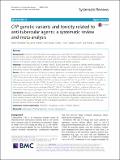Files in this item
CYP genetic variants and toxicity related to anti-tubercular agents: a systematic review and meta-analysis
Item metadata
| dc.contributor.author | Richardson, Marty | |
| dc.contributor.author | Kirkham, Jamie | |
| dc.contributor.author | Dwan, Kerry | |
| dc.contributor.author | Sloan, Derek J. | |
| dc.contributor.author | Davies, Geraint | |
| dc.contributor.author | Jorgensen, Andrea L. | |
| dc.date.accessioned | 2018-11-21T10:30:13Z | |
| dc.date.available | 2018-11-21T10:30:13Z | |
| dc.date.issued | 2018-11-20 | |
| dc.identifier | 256653507 | |
| dc.identifier | c7e4899f-2aa0-4e58-8961-aca2d4bcf8b5 | |
| dc.identifier | 85056802978 | |
| dc.identifier | 000450865300005 | |
| dc.identifier.citation | Richardson , M , Kirkham , J , Dwan , K , Sloan , D J , Davies , G & Jorgensen , A L 2018 , ' CYP genetic variants and toxicity related to anti-tubercular agents: a systematic review and meta-analysis ' , Systematic Reviews , vol. 7 , 204 . https://doi.org/10.1186/s13643-018-0861-z | en |
| dc.identifier.issn | 2046-4053 | |
| dc.identifier.other | RIS: urn:F88DB7584C9A6A3E18CE6A94993490FC | |
| dc.identifier.other | RIS: Richardson2018 | |
| dc.identifier.other | ORCID: /0000-0002-7888-5449/work/60631022 | |
| dc.identifier.uri | https://hdl.handle.net/10023/16517 | |
| dc.description | MR is supported partly by Liverpool Reviews and Implementation Group (LRiG), based on funding from the National Institute for Health Research Health Technology Assessment Programme (URL, https://www.nihr.ac.uk/funding-and-support/funding-for-research-studies/funding-programmes/healthtechnology-assessment/), and partly by the Effective Health Care Research Consortium, which is funded by UKAid from the UK Government Department for International Development (Grant number, 5242; URL, https://www.gov.uk/government/organisations/department-for-international-development). | en |
| dc.description.abstract | Background: Treatment with anti-tuberculosis drugs may cause patients to experience serious adverse effects. Genetic factors, such as polymorphisms of CYP genes, may increase the likelihood of a patient experiencing such adverse drug reactions. In this systematic review and meta-analysis, we synthesised evidence for associations between CYP genetic variants and anti-tuberculosis drug-related toxicity outcomes. Methods: We searched MEDLINE, PubMed, EMBASE, BIOSIS and Web of Science to identify relevant studies. We performed meta-analyses to obtain an effect estimate for each genetic variant on each outcome, and stratified all analyses by country. We qualitatively assessed the methodological quality of the included studies. Results: We included data from 28 distinct cohorts of patients in the review. We identified many areas of concern with regard to the quality of included studies. Patients with homozygous mutant-type or heterozygous genotype at the CYP2E1 RsaI polymorphism were significantly less likely to experience hepatotoxicity than patients with homozygous wild-type genotype (odds ratio [OR] = 0.75, 95% confidence interval [CI] 0.56–1.00; p = 0.047, I2 = 58.2%). No significant differences were observed for the CYP2E1 DraI and PstI polymorphisms. For the 96-bp deletion-insertion single-nucleotide polymorphism (SNP) of the CYP2E1 gene, homozygous mutant-type significantly increased hepatotoxicity risk compared with homozygous wild-type (OR = 8.20, 95% CI 1.38–48.68, I2 = 0%); no significant difference was observed for heterozygous genotype compared with homozygous wild-type (OR = 0.77, 95% CI 0.19–3.21, I2 = 0%). Conclusions: Generally, we identified that coverage of the association between SNPs of CYP genes and anti-tuberculosis drug-related toxicity outcomes is incomplete. We observed significant associations between the RsaI and 96-bp deletion-insertion SNPs of the CYP2E1 gene and anti-tuberculosis drug-related hepatotoxicity. We were unable to comment on the impact of ethnicity on the investigated associations, as information on participants’ ethnicity was sparsely reported in the included studies. | |
| dc.format.extent | 15 | |
| dc.format.extent | 1303250 | |
| dc.language.iso | eng | |
| dc.relation.ispartof | Systematic Reviews | en |
| dc.subject | Tuberculosis | en |
| dc.subject | Pharmacogenetics | en |
| dc.subject | Toxicity | en |
| dc.subject | Meta-analysis | en |
| dc.subject | RA0421 Public health. Hygiene. Preventive Medicine | en |
| dc.subject | NDAS | en |
| dc.subject | SDG 3 - Good Health and Well-being | en |
| dc.subject.lcc | RA0421 | en |
| dc.title | CYP genetic variants and toxicity related to anti-tubercular agents: a systematic review and meta-analysis | en |
| dc.type | Journal article | en |
| dc.contributor.institution | University of St Andrews. School of Medicine | en |
| dc.contributor.institution | University of St Andrews. Infection and Global Health Division | en |
| dc.identifier.doi | https://doi.org/10.1186/s13643-018-0861-z | |
| dc.description.status | Peer reviewed | en |
This item appears in the following Collection(s)
Items in the St Andrews Research Repository are protected by copyright, with all rights reserved, unless otherwise indicated.

